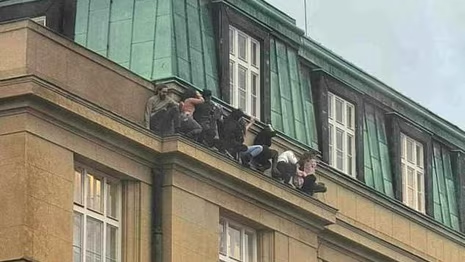Again this morning Prague woke up in shock from the terrible event of violence that shook the country on the afternoon of 21 December.
By Sandro Curatolo
A 24-year-old man broke into the Faculty of Philosophy of Carolina University, which is located in the city centre, and opened fire on students and professors, killing fifteen people and seriously wounding many others.
After killing his father, the young man went to the university, where he tried to claim as many victims as possible, even shooting wildly from a window overlooking a busy downtown street.
The population finds it hard to believe that such an event, reminiscent of the Columbine High School massacre in the United States, could have occurred in such a seemingly peaceful country. Despite the great fuss made by opinion-makers, it is hard to understand the connection between the current situation and the massacre that took place.
One wonders how it is possible that something similar could happen in the peaceful Czech Republic… National and international politicians are competing to call themselves shocked by what happened. Still, there seems to be a kind of collective amnesia that prevents them from grasping the connection between the events.
Some factors are being overlooked in the public debate that could help to better interpret both the origins of what happened and the future dangers.
First of all, to say that the Czech Republic is a ‘quiet country’ is quite questionable, given that it is one of the most active countries in the sale (legal and illegal) of ‘light’ weapons. It is difficult to find a conflict, a coup d’état, or an attack in recent years in which the Czech Republic has not been actively involved in arms sales. It is therefore appropriate to reassess this aspect.
Another striking aspect is that the Czech Republic has recently amended its Constitution and laws to facilitate the possession and use of firearms by the population, invoking an alleged need for defence in the event of a terrorist attack. In short, the Czechs challenged European rules limiting the possession of semi-automatic weapons by civilians. Former Interior Minister Milan Chovanec said: ‘We do not want to disarm our citizens at a time when the security situation in Europe is worsening’. Today he will have something to think about.
Another aspect worth reflecting on is the very strong campaign of terror and insecurity that has been carried out over the past fifteen years, trying to convince the population of the ‘danger of invasion’ and the absolute necessity to defend themselves. There has been a shift from propaganda about the need to defend oneself against the Islamic danger to defending oneself against the Russian danger. These claims have no basis in fact, but after careful hammering, this is of little importance. The fact is that the population has been strongly influenced in this respect. The project of ‘militarisation’ of this country has been going on for years now.
An almost pathological example of this trend has been the army’s campaign (which has been going on for years now) in primary and secondary schools, with soldiers showing children weapons and how to use them, making them try them out, and explaining the need to defend the country and the importance of the army’s role and weapons for this purpose.
On the occasion of the passage of the US Dragoon Ride exercise (which passed through Prague in 2015, when US tanks roamed freely through the city) the doors of the schools were opened to the US army and children were able to visit the tanks, see the most modern weapons up close, etc. In short, a real domestication to war has been going on for fifteen years. The boy who opened fire on his university classmates yesterday had perhaps handled his first semi-automatic weapon right within the walls of his classroom.
The exaltation of armed defence accelerated with the conflict in Ukraine. The Czech Republic has been one of the most vocal advocates of the need to arm Ukraine.
In the Czech Republic, there are sites where one can go and legally buy weapons to donate to Ukraine. One can go online and buy a grenade or a machine gun to give away. Paradoxically, the symbol of peace often appears on these sites. In no uncertain terms, the message is: ‘Peace is made with weapons’.
All this takes place in parallel with a kind of demonisation and ridicule of pacifism, in a debate that also ended up determining the last presidential election, which resulted in the election of a former NATO general. This seems to be the crowning achievement of a policy that has been pursued for years. Finally, the Czech people, who tend to be peaceful and very moderate, decided to be led by a military man.
Considering the current situation and the pressures at hand, yesterday’s event might provoke some more reflection. Unfortunately, the summary that will be made will focus on the need to increase security, suggesting metal detectors outside schools or even the possibility for students to carry weapons in the classroom to defend themselves in case of attack. This bloody event will therefore end with state funerals and a sharp increase in defence spending.
A defence that, so far, has only served to make this country more fearful and more insecure.






